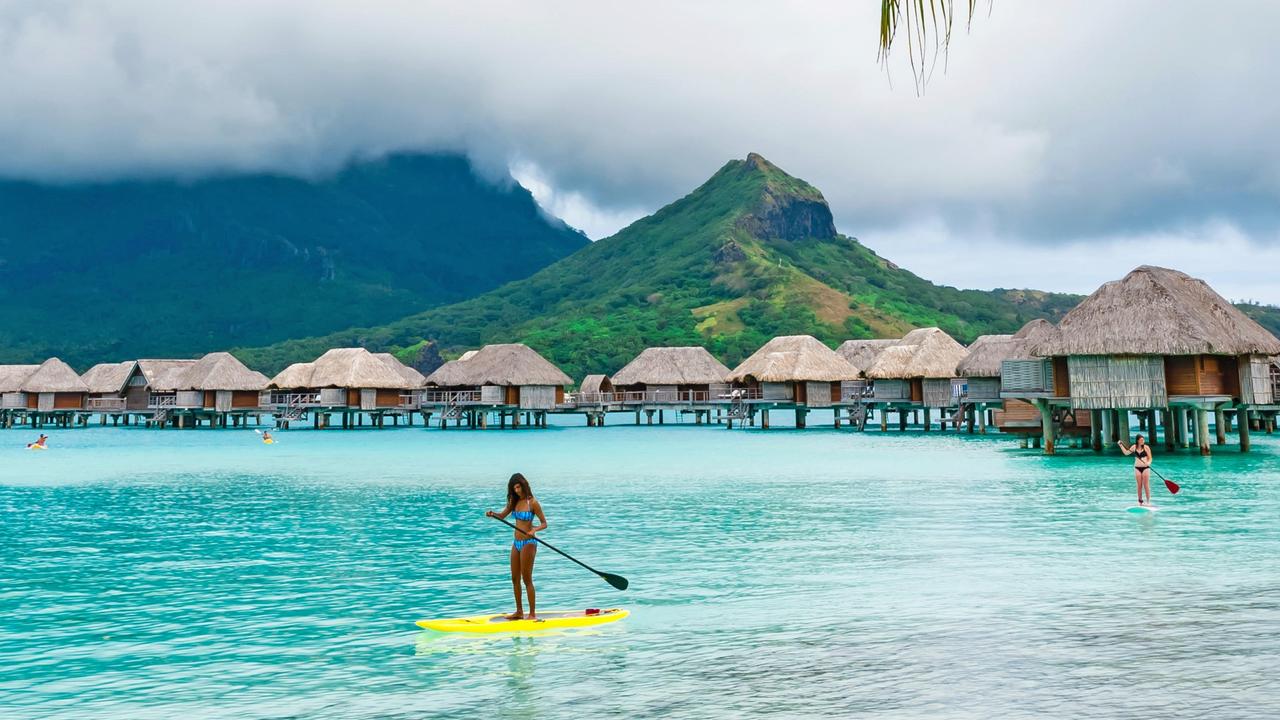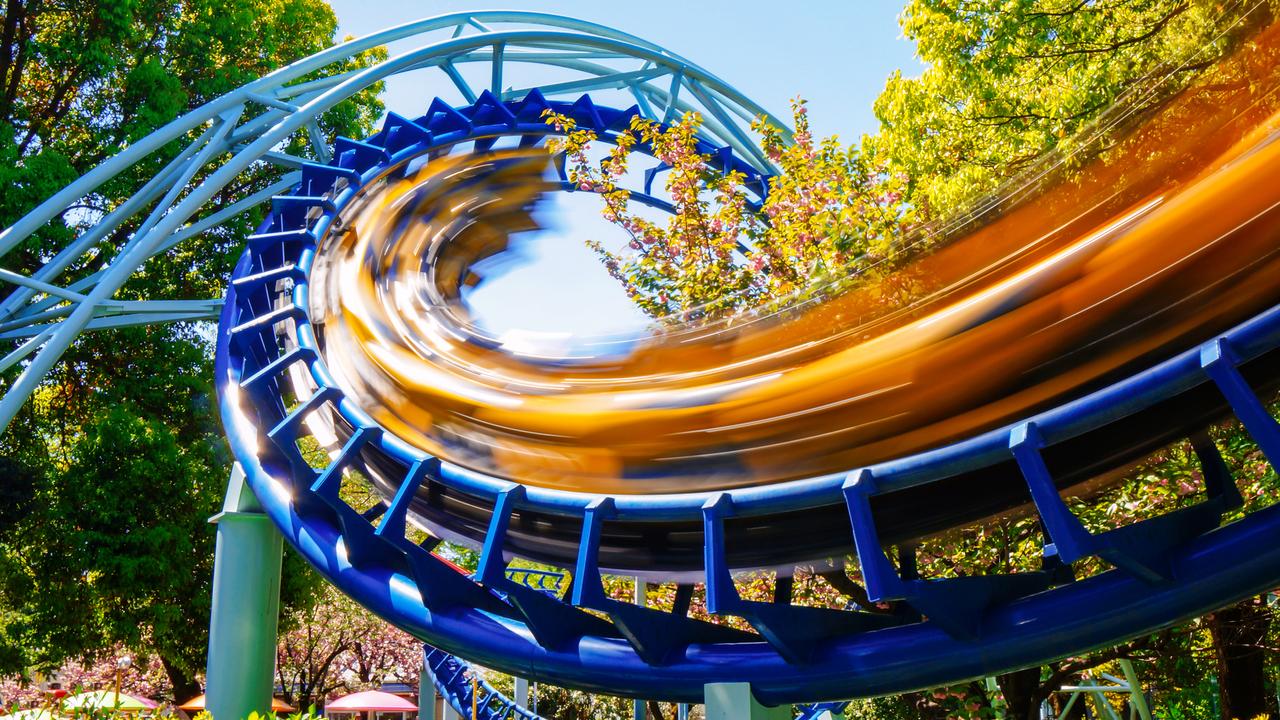10 things every caravanner needs to know
It’s the little things that make a difference when you’re road-tripping with a van — and these expert secrets will change the way you travel.
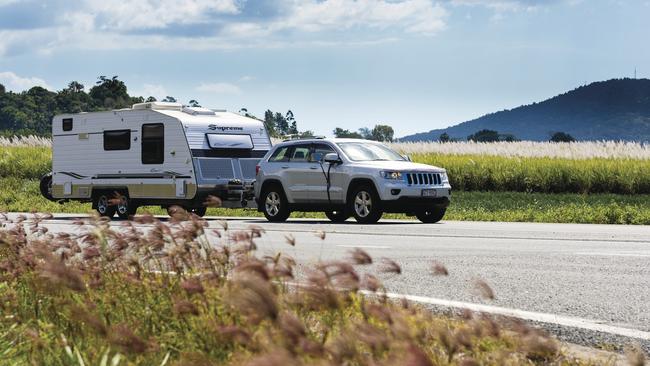
Family
Don't miss out on the headlines from Family. Followed categories will be added to My News.
With overseas travel off the cards, Australia’s caravan industry is booming, with everyone from retirees to young families and cool couples hitting the road with a tin trailer in tow.
But if you’re new to the community, there is a lot you need to learn, from how to make reversing easy to tricks for keeping your crockery in one piece.
CARAVANS HITTING THE ROAD AGAIN
KITCHEN CUPBOARDS
After stocking up your kitchen with cool tropical-themed tumblers or stemless wine glasses, the last thing you want is to have them break while rolling around in your cupboards. To hold them in place, line your cupboards with non-slip matting (which you can find from $5 at Kmart, or at camping and hardware stores). Another trick is to buy small slabs of foam and cut out mug- and bowl-sized holes.
As for small items such as bottles of herbs, store them together in a small basket that’s easy to access when needed. And if you really can’t live without your new coffee machine or blender, pack them in a drawer with towels and extra linen for cushioning.
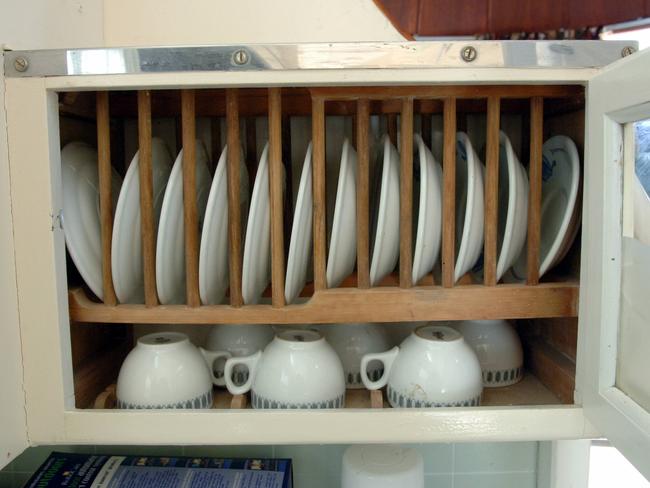
COLLAPSIBLE HOMEWARES
Storage is a big issue for caravanners, especially those on big trips, but there are a few ways you can free up space. One of those is stocking up on collapsible homewares, and these can be everything from laundry baskets that fold flat to Tupperware and washing up tubs that can be squashed into themselves. You can even buy collapsible kettles, saving a huge chunk of space.
For food, Lee Atkinson, author of Explore Australia by Camper Trailer, suggests using sandwich bags over Tupperware. “Store food, leftovers and anything that might spill or shake open in transit in a resealable sandwich bag,” Lee says. “They take up less room than plastic containers and protect against spills.”
Rubber bands are also a nifty storage aid. “When you’re travelling on rough roads anything that can pop open, unwind or unravel will,” Lee says. “Almost everything in our fridge and kitchen, including toilet paper rolls, has a rubber band around it.”
It’s a no-brainer but a simple tip is to make a checklist of jobs and tick them off each time you get ready to move to a new campsite. On that list should be making sure all cupboards and drawers are latched. If you have an old caravan, consider replacing any cracked catches (handles). A quick Google search will reveal plenty of new catches for sale online.
SAFEGUARDING AGAINST ANTS
Mozzies and flies can be irritating on any holiday but ants take the cake when it comes to caravanner woes. Nowhere is off-limits for these pesky insects so have some remedies for ridding your van of them when you have an encounter (and you will). Some travellers swear by natural solutions such as placing the legs of your caravan in dishes of water that ants can’t cross, while others will vouch for store-bought chemical sprays that can be applied to any surfaces ants come into contact with. Whatever your preference, have an option on hand, either in your vehicle or out of harm’s way in a high cupboard in the van.
To reduce your chances of an ant encounter, avoid using plastic wrap and pegs on half-opened food items. Instead, store food, especially honey, sugar and jam, in airtight Tupperware or bags in the fridge.

PLANNING ON THE GO
If you’re heading off on an extended trip, it’s likely you’ll have big intentions of keeping on top of finances by cleverly securing the most affordable campsites, and avoiding hefty fuel prices. To help you meet these goals, Bec Lorrimer, co-founder of the blog Trip In A Van, suggests downloading a few handy apps to help you plan while you’re on the road. “Our favourite apps to use when caravanning include WikiCamps to locate caravan parks and free camps, dump points and water,” says Bec.
The mother-of-three has been caravanning around Australia with her husband and children for 2½ years. During that time, she’s also used Fuel Map to find the closest petrol station and track mileage, and says TrackMyTour is great for plotting stops on a digital map.
GETTING LEVEL
Sleeping on an angle is never fun so before setting off on your caravanning adventure make sure you have tools to help make your campsite level. These can be anything from carrying a couple of bricks or blocks of wood to owning plastic wedges you can easily roll onto. You will also want to have a spirit level to make setting up quick and precise.
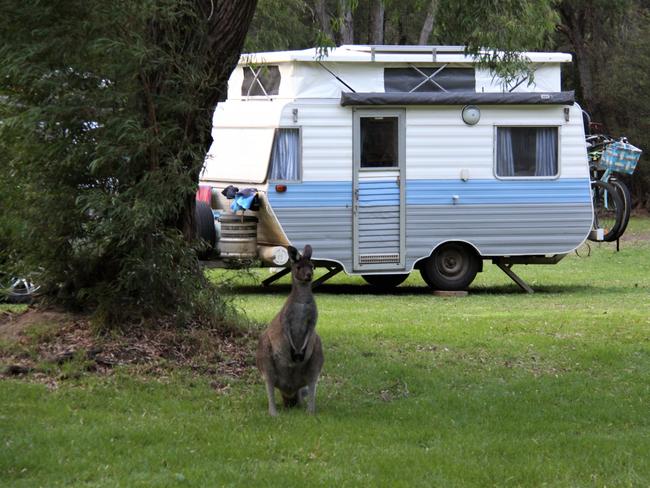
WHEN THE WEATHER IS WILD
Every camper seems to have a story about getting caught out in wild weather but you don’t have to let a day of strong wind or sideways rain ruin a week-long holiday. If you’re staying in a tent or have a caravan annex, it’s always wise to use guy ropes in case wind rips through overnight. Every type of camper should also carry extra tent pegs (and strong ones) for securing tarps and awnings. Don’t hesitate to roll up your awning either; it’s better than having it snap off and do serious damage to your van or somebody else’s.
KEEPING CLEAN
As for tricks for making your camp more comfortable, a door mat goes a long way to keeping your van clean. If you’ve set up on sand or fine dirt, you will also want outdoor flooring, such as a rubber “safety mat”, which comes in squares and fits together like a jigsaw. These are popular because they’re easy to hose down, are a soft-fall option for young children and pack up small.
If you’re travelling through the Outback, expect the iconic red soil to make a mess of your vehicle and trailer. With water a scarce commodity there, Lee Atkinson advises travellers to carry a refillable spray bottle for quick clean-ups and hand washing. That way, you’re not using precious drinking water from your caravan’s tank to stay clean.
“You’ll be amazed at how much water you save,” Lee says.

KEEP IT COOL
Refrigeration is one of the biggest issues in the Australian caravan industry, with fridges struggling in our extreme climate.
If you’re heading to Australia’s hottest locations, buy a fridge shade (also known as a fridge vent awning), which covers the back of the fridge on the exterior of the caravan and keeps it out of direct sunlight.
Also, if you have a drip tray under your freezer, try pulling it forward slightly to allow cool air to flow down the back of the fridge. This will also reduce heat.
COOKING
The best caravanning trips are the ones where you’ve chilled out with friends around a campfire, but sometimes the wind, wet and just bad luck make getting a flame going difficult. Preparation is key, and experienced caravanners will say success comes down to how you’ve built your fire. That means a decent amount of newspaper or firelighters to get it going, a teepee of small kindling built over the top and a few pieces of medium-size wood that won’t suffocate the flame.
Make sure you use dry and aged wood (green wood will send smoke through the campsite). If you don’t have firelighters, Bec Lorrimer suggests resorting to potato chips.
“No joke,” she says. “You’ll have a campfire cranking in no time.”
REVERSING
There’s no doubt a reversing camera on both your caravan and vehicle makes manoeuvring into a campsite and hitching a breeze but not all of us have those luxuries. Other options to help with reversing are extendible towing mirrors and there are plenty of styles on the market, from top-of-the-range models that replace standard car mirrors to others that attach to doors. If extra mirrors are still beyond your budget, you’ll have to rely on your trusty navigator to direct you. If that doesn’t work or you’re travelling solo, stay at a holiday park and ask one of the staff to help.
For more travel news and inspiration sign up to Escape’s newsletter.
Originally published as 10 things every caravanner needs to know

